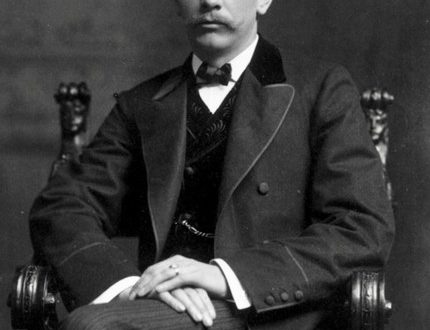
Valentin Vasilievich Silvestrov (Valentin Silvestrov) |
Valentin Silvestrov

Only the melody makes the music eternal…
It would probably seem that in our time these words would be typical for a songwriter. But they were uttered by a musician whose name has for a long time been labeled an avant-gardist (in a pejorative sense), a subverter, a destroyer. V. Silvestrov has been serving Music for almost 30 years and, probably, following the great poet, he could say: “God did not give me the gift of blindness!” (M. Tsvetaeva). For his whole path – both in life and in creativity – is in a steady movement towards comprehending the truth. Outwardly ascetic, seemingly closed, even unsociable, Sylvestrov actually tries to be heard and understood in each of his creations. Heard – in search of an answer to the eternal questions of being, in an effort to penetrate the secrets of the Cosmos (as a human habitat) and man (as a bearer of the Cosmos in oneself).
The path of V. Silvestrov in music is far from simple, and sometimes dramatic. He started learning music at the age of 15. In 1956 he became a student at the Kyiv Civil Engineering Institute, and in 1958 he entered the Kyiv Conservatory in the class of B. Lyatoshinsky.
Already in these years, the consistent mastering of all kinds of styles, composing techniques, the formation of his own, which later became absolutely recognizable handwriting, began. Already in the early compositions, almost all aspects of Silvestrov’s composer’s individuality are determined, according to which his work will further develop.
The beginning is a kind of neoclassicism, where the main thing is not formulas and stylization, but empathy, understanding of the purity, light, spirituality that the music of high baroque, classicism and early romanticism carries in itself (“Sonatina”, “Classical Sonata” for piano, later “Music in the old style “, etc.). Great attention in his early compositions was paid to new technical means (dodecaphony, aleatoric, pointillism, sonoristics), the use of unusual performance techniques on traditional instruments, and modern graphic recording. Landmarks include Triad for piano (1962), Mystery for alto flute and percussion (1964), Monody for piano and orchestra (1965), Symphony No. 1966 (Eschatophony – 1971), Drama for violin, cello and piano with its happenings, gestures (60). In none of these and other works written in the 70s and early 2s is technique an end in itself. It is only a means for creating ecstatic, vividly expressive images. It is no coincidence that in the most avant-garde works from the technical point of view, the most sincere lyricism is also highlighted (in the soft, “weakened”, in the words of the composer himself, music through the serial XNUMX parts of the First Symphony), and deep philosophical concepts are born that will lead to the highest manifestation of the Spirit in the Fourth and Fifth Symphonies. This is where one of the main stylistic features of Silvestrov’s work arises – meditativeness.
The beginning of a new style – “simple, melodic” – can be called “Meditation” for cello and chamber orchestra (1972). From here begins constant reflections about time, about personality, about the Cosmos. They are present in almost all of Silvestrov’s subsequent compositions (the Fourth (1976) and Fifth (1982) symphonies, “Quiet Songs” (1977), Cantata for choir a cappella on the station T. Shevchenko (1976), “Forest Music” on the station. G. Aigi (1978), “Simple Songs” (1981), Four songs on O. Mandelstam’s station). Long listening to the movement of time, attention to the smallest details, which, constantly growing, as if falling one on another, create a macroform, takes the music beyond the sound, turning it into a single spatio-temporal whole. Endless cadence is one of the ways to create “waiting” music, when a huge inner tension is hidden in the outwardly monotonous, undulating static. In this sense, the Fifth Symphony can be compared with the works of Andrei Tarkovsky, where outwardly static shots create super-tense inner dynamics, awakening the human spirit. Like Tarkovsky’s tapes, Sylvestrov’s music is addressed to the elite of mankind, if by elitism one really understands the best in a person – the ability to deeply feel and respond to the pain and suffering of a person and humanity.
The genre spectrum of Silvestrov’s work is quite wide. He is constantly attracted by the word, the highest poetry, which requires the finest insight of the heart for its adequate musical recreation: A. Pushkin, M. Lermontov, F. Tyutchev, T. Shevchenko, E. Baratynsky, P. Shelley, J. Keats, O. Mandelstam. It was in the vocal genres that the gift of Sylvestrov the melodist manifested itself with the greatest force.
A very unexpected work occupies a special place in the composer’s work, in which, however, his creative credo seems to be focused. This is “Kitch Music” for piano (1977). In the annotation, the author explains the meaning of the name as something “weak, discarded, unsuccessful” (that is, close to the dictionary interpretation of the concept). But he immediately refutes this explanation, giving it even a nostalgic interpretation: _Play in a very gentle, intimate tone, as if gently touching the listener’s memory, so that the music sounds inside the consciousness, as if the listener’s memory itself sings this music_. And the worlds of Schumann and Chopin, Brahms and Mahler, the immortal inhabitants of Time, which Valentin Silvestrov feels so keenly, really return to memory.
Time is wise. Sooner or later, it returns to everyone what they deserve. There was a lot of things in Silvestrov’s life: an absolute misunderstanding of “near-cultural” figures, and a complete disregard for publishing houses, and even expulsion from the Union of Composers of the USSR. But there was another thing – the recognition of performers and listeners in our country and abroad. Silvestrov – laureate of the Prize. S. Koussevitzky (USA, 1967) and the International Competition for Young Composers “Gaudeamus” (Netherlands, 1970). Uncompromisingness, crystal-clear honesty, sincerity and purity, multiplied by high talent and a huge inner culture – all this gives reason to expect significant and wise creations in the future.
S. Filstein





